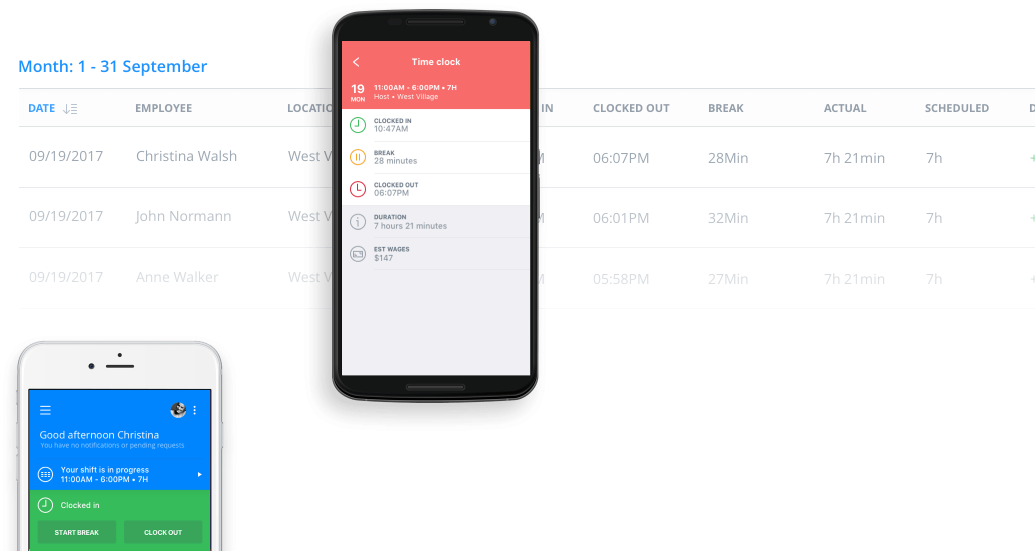15 Tips for Building a Stronger Restaurant Culture
Want to improve what your team members do, what they say, how they behave, and h...

Are you striving to improve your business in a real and lasting way? Don’t assume that the first step should be to invest in the most visible—and expensive—components, like infrastructure, facilities, and IT. Instead, shift your focus and invest in one of the least-visible components: ethics in the workplace. When you address these basic behavioral concerns before anything else, it can have a profound impact on every aspect of your business.
But improving ethics in the workplace is much easier said than done. Where do you start? What specific ethics should you choose? Where and when is the ethics program communicated to your employees? The experts at Sling are here to answer those questions. In this article, we’ll talk about:
We’ll also show you how you can improve your clock-in/clock-out procedure as an easy first step toward reforming ethics in the workplace.
Excellence applies to a product or quality of service that surpasses ordinary standards. When you establish a company-wide drive toward excellence—and make it understood that no one should settle for less—you take the first step toward improving the overall quality of your business.
Examples of broken trust are everywhere in the news these days. Customers don’t trust businesses. Employees don’t trust management. Management doesn’t trust the government. You can change all that by stressing the importance of doing what you say you’ll do and fulfilling expectations no matter how difficult it may be.
Courteousness doesn’t just apply to customer-facing roles. Each and every person in your business—from the CEO down to the night janitor—should be respectful, polite, and well-mannered at all times.

Honesty means being open and transparent about your actions. It means being truthful even if that truth makes you look bad. When all team members and management conduct themselves with a sense of honesty, it builds trust and goodwill. Over time, your customers and clients will sense that good feeling and appreciate your business more for it.
Competency is the ability to do a job properly, and it’s the first step on the road to excellence. You can encourage competency in your employees by giving them the knowledge and skills necessary to perform every task to a high set of standards. When you train your employees accordingly and they perform their jobs well, you reinforce the professionalism that is so highly coveted in business these days.
Here’s a clear and concise definition of morality you can use for all your employees:
Morality is playing by the rules even when no rulebook exists.
Communicate to your employees that acting with a clear moral conscience is always the right thing to do, even if it’s bad for the business.
Accountability is a combination of competency, honesty, and trustworthiness. It means taking responsibility for your actions regardless of the consequences. As a manager, you should encourage a sense of accountability by not being overly critical when a small mistake is made. Let your employees see that you value honesty more than results.

A business is a group of individuals all working toward the same goal. Because of that, cooperation is vital if your business is going to succeed. Highlight the importance of cooperation in everything that you and your team members do. Reward the good examples of cooperation and discourage the bad ones. That way, your team members will know exactly what is required of them when it’s time to work together.
Now that you’ve learned about examples of ethics in the workplace, let’s see how you can develop a program to make them a part of your business.
Here are six simple steps to help you develop an ethics program that is tailored to your specific business needs.
Even the best ethics program is useless if your employees don’t take it seriously. The key to success, then, lies in making ethics relevant. You have to convince your team members that operating under a code of ethics will make them better at their jobs and add to the integrity of the business as a whole.
Every business is different, so no one-size-fits-all ethics program will do. The program you develop for your workplace should be tailored to the goals and culture you’ve already established.

The only way your ethics program will be successful is if you get feedback and suggestions from every level of your business. Don’t restrict your information-gathering to just the senior staff. They have valuable input, yes, but they often only talk to other senior staff members.
Senior employees seldom interact with workers on the front line, so how could they know the necessary ethics for those jobs? For that information, you have to engage team members in every position and at every level of the business hierarchy.
There are two basic types of ethics programs:
The best structure will depend on your business. Most programs, though, are a combination of both rules and principles that guide team members in their activities.
Integrate ethics into every aspect of your business culture by providing repeated and ongoing training for all your employees. During that training, help your team members develop the skill to think about ethics before acting.
Business culture and practices ultimately originate at the top, with the CEO. That’s why it’s imperative that your top management positions let their actions speak louder than their words. It’s great for a CEO, CFO, or CTO to talk with team members about doing the right thing, but if they’re not going to operate under those same ethics, the program is a lost cause. Employees will take their cue from the head of the organization.
Your employee handbook is where your ethics program starts and ends. It’s the first place new hires will be exposed to your company values. It’s also the resource that all employees will turn to when a question of ethics arises. That’s why it’s essential to your business success that you follow some simple rules when creating an employee handbook.
When you use the employee handbook as the foundation for your ethics-in-the-workplace program, you set a precedent that can have long-term beneficial effects on the way your team members work together and apart.
Now, let’s look at a simple way you can use your time clock to reform the ethics in your business.
Clocking in and out is one of the first opportunities for ethics in the workplace to falter. There’s a lot riding on the results of your employees’ time cards: money, advancement, even their jobs. Because of that, honesty and accountability are often the first ethics to go when someone has to clock in late or clock out early.
You can help keep your employees honest by using an integrated time clock/scheduling app like Sling.

Sling’s time clock feature allows you to:
And that’s only the tip of the iceberg. Sling also streamlines the scheduling process, simplifies communicating with your employees to find substitutes, keeps you and your team members engaged and on task, and so much more.
Visit GetSling.com today to see how you can use this free app to get a head start on transforming your business with ethics in the workplace.
See Here For Last Updated Dates: Link
This content is for informational purposes and is not intended as legal, tax, HR, or any other professional advice. Please contact an attorney or other professional for specific advice.
Schedule faster, communicate better, get things done.